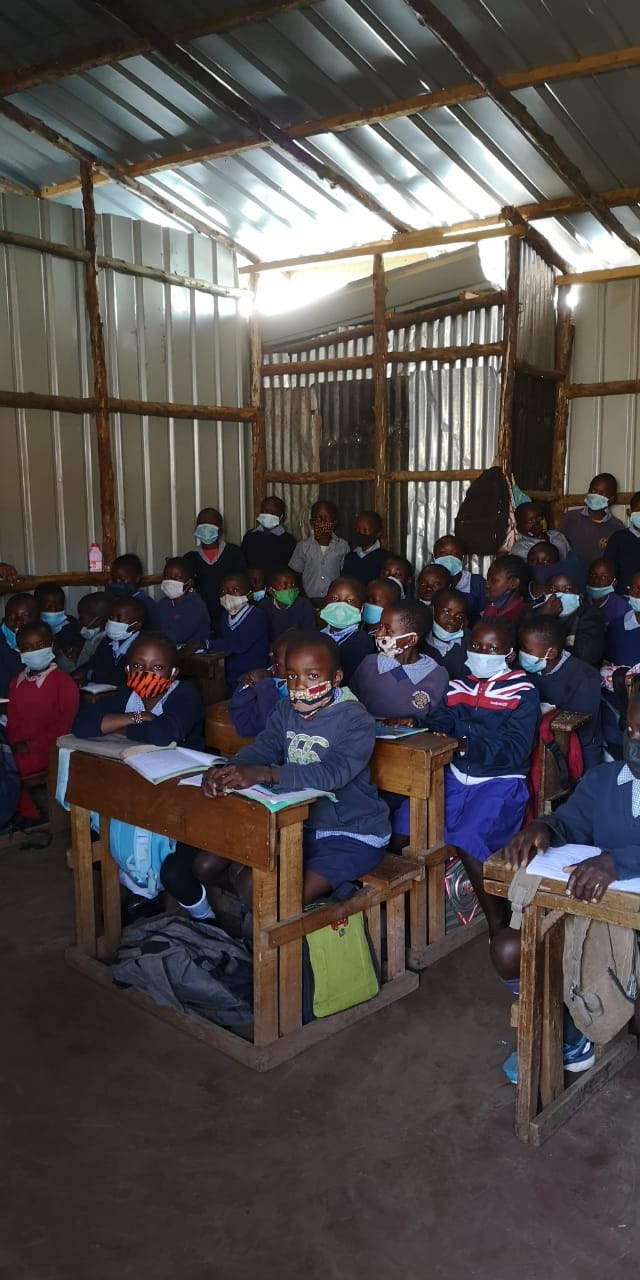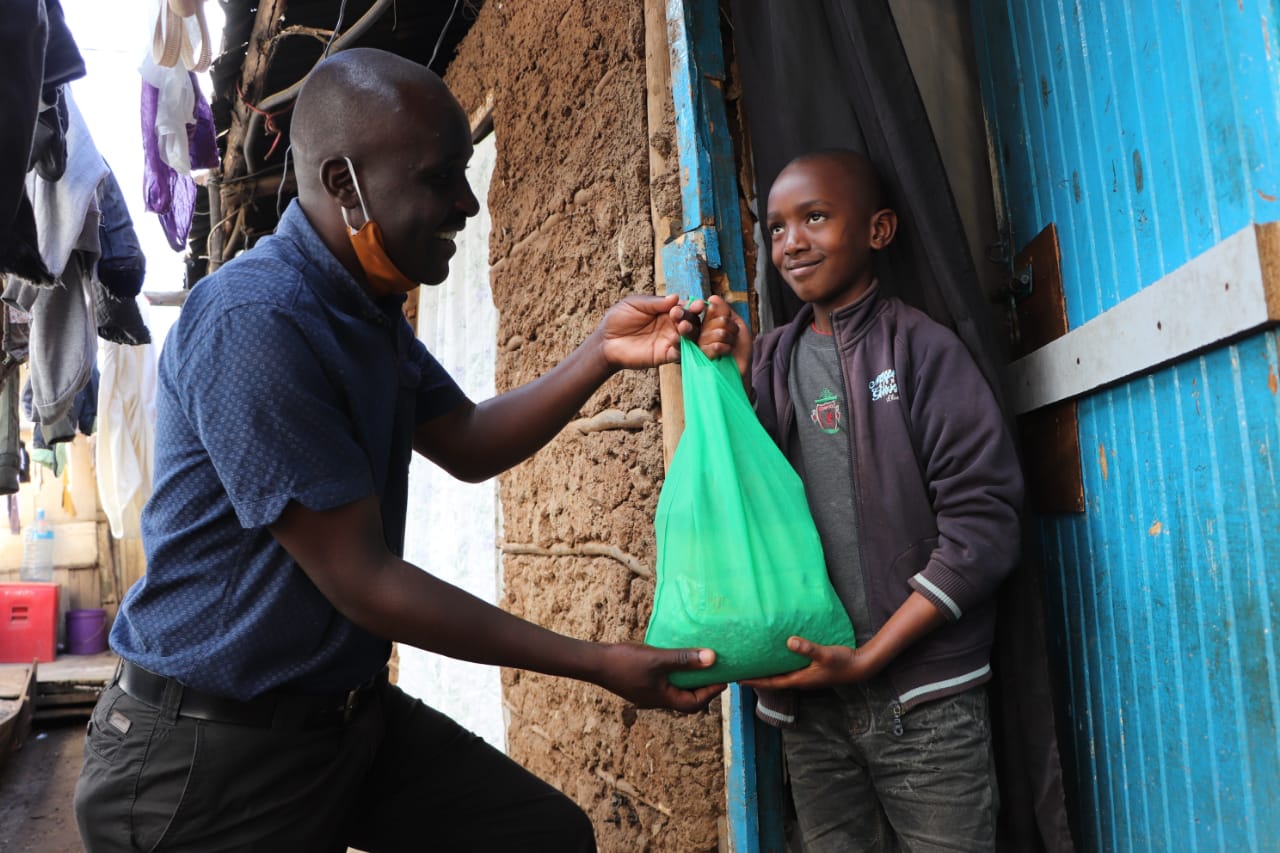From there, arche noVa received an acute call for help in autumn. In Kenya, the Corona crisis with its strict curfews, school closures and contact bans had led not only to a containment of the spread of the virus, but also to people losing their jobs. Day labourers, who depend on earning at least one meal for their families every day, were no longer allowed outside. The sick, including many HIV-infected people who need regular medication and a special diet, could no longer care for themselves. Especially in Kibera, where more than 250,000 people live in cramped quarters with inadequate sanitation, hardly any hand-washing facilities and no waste disposal, the number of infectious diseases increased massively during the pandemic. Need and hunger were even more dramatic than they already were, and the number of violent crimes and criminality also increased. As is often the case, the most vulnerable in society, including thousands of children, suffered.
For many of them, St. Juliet School, one of the few schools in Kibera, was also always a safe place. 567 children between the ages of four and 16 came here every day to learn and play. They often sat in the classroom with 50 other children and many brought worries from home. Nevertheless, St. Juliet was a place where they were allowed to be children, where they were protected from beatings, where they received praise and affirmation. All this suddenly disappeared when the schools were closed in spring to protect them from Corona. The consequences were dramatic: teenage pregnancies - 25 in five months alone, child labour, drug abuse, forced marriages, hunger, violence.
This could not be allowed to happen, the 16 teachers of St. Juliet thought, and sought help. With the support of Aktion Deutschland Hilft, the arche noVa team was able to intervene quickly in October.
"The most important thing was to get the children back in school and to provide support to those most affected - about 400 children and 172 families in need - to alleviate the worst of the hardship," explains Yvonne Stephan, arche noVa project officer.
For this, hygiene precautions had to be implemented in the school first - hand washing stations with soap were set up and explanatory pictures were put up, the children wore masks and fever was measured before entering the school grounds.
In the protected space of the school, games and singing lessons were offered, painting, rhyming and small plays were rehearsed. The topics were also Corona prevention and hygiene rules - learned and practised through play, even for the youngest children.
One of the most important measures was the school lunch for 400 children - the same corn and beans every day, but freshly cooked and warm.
"I am so happy that there is a hot lunch at my school. Many of my friends sit hungry in the classroom elsewhere. It's not a good place to study, especially when you have to prepare for your final exams, like I do."
When St. Juliet reopened in the autumn, the student was overjoyed. "I am working hard now so that I can get good grades and then go to a good high school," Fantesia says. When she grows up, she wants to be a journalist.
The aid project in Kibera also brought a little hope to 84-year-old Ismail Hassan. Due to an accident in which both legs had to be amputated, the old man is disabled and dependent on help. In everyday life, his family usually supports him, but during the pandemic, his relatives lost their jobs. "Sometimes there was something to eat, but often we held out for days without food and had to go to sleep hungry. It was terrible. We were always afraid of starving," says the senior, who also looks after his grandson Esmael. He attends St. Juliet School and had reported the family's dramatic situation and received support.
In the course of our project, a total of 172 particularly needy families were provided for, including foster families of orphans, single mothers, AIDS patients and pregnant girls. For three months, they each received a food parcel containing two kilos of maize flour, one kilo of beans and one litre of oil per week. Those who could, were allowed to pick up the relief supplies at St. Juliet School. For families who could not, like Ismail Hassan, the teachers distributed the food parcels in the neighbourhood - with distance and mask, but also with warm words and a bit of hope.
"I haven't been hungry since October. I feel strengthened and very grateful," Ismail Hassan says. "When the teachers from St. Juliet came by, there was always a bit of chatting. You see new faces, hear something different. That was good for me," says the senior and smiles at his grandson Esmael."
He is already looking forward to the next school day in St. Juliet. For now, everyone is back. Even the teachers. Some of them had lost their jobs during the Corona crisis, because the school fees of the children in the lockdown were not paid. The aid project of arche noVa also ensured that teachers received a small stipend and were thus able to take care of the school children and the needy families in the neighbourhood again. What will happen next? No one knows exactly. The pandemic is not over, the fear is great and the need is great in Kibera - but so is the hope that everything will be all right again.














